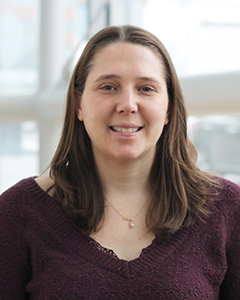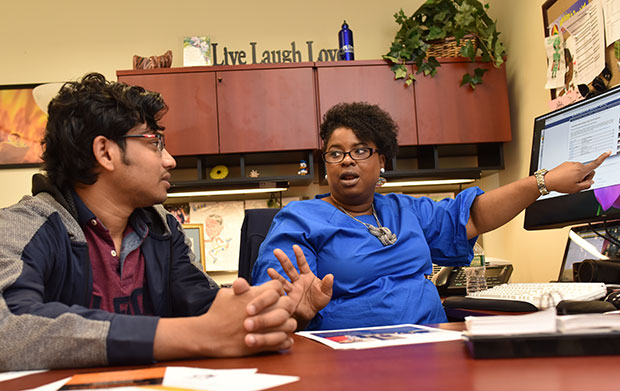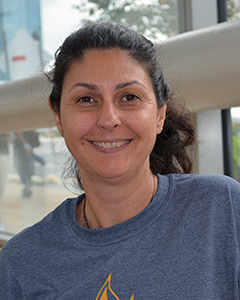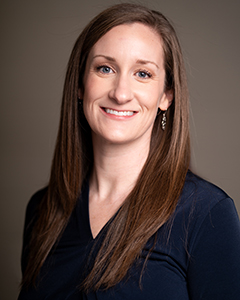The College of Engineering has more than 15 full-time undergraduate advisors who guide students through the requirements, opportunities, and challenges of their chosen field of study. To mark the beginning of the Fall 2018 term, we asked four of them for their best counsel: Haley Dervinis, Associate Director of Undergraduate Advising, Department of Electrical and Computer Engineering; Gerry Willis, Assistant Director/Advisor Engineering Technology; Rosemary Sullivan, Associate Director, Undergraduate Advising Center, Department of Mechanical Engineering and Mechanics; and Dionne Gordon-Starks, Senior Academic Advisor, Undergraduate Advising Center, Department of Civil, Architectural and Environmental Engineering.
What is your advising philosophy?

Haley Dervinis
DERVINIS: I believe students can and will make their own best decisions. I see my role as guiding them towards resources, listening to their thoughts, encouraging them to challenge themselves, and helping them collect information so they can make educated choices. Students usually think I am caring, straightforward, helpful, and knowledgeable.
WILLIS: It depends on the issue students have. I usually ask a lot of questions to better understand the issue and the goal of the student. When a student wants to withdraw from a class, for example, I ask him/her why/what difficulties they have and give them advice on where they can get tutoring help; or if it is a time-management issue, how to better organize their time. If the material is the problem, I advise them to read the chapters before going to class and then again after, when the material is fresh, and to do homework on the same day -- between classes, if possible.
SULLIVAN: My advising philosophy focuses on student growth, both academically and personally. A brand-new freshman may have different needs than a student who is coming back from their first co-op experience. A student’s time at Drexel is a process, a journey, and their needs change. Sometimes that means assisting with course registration, and sometimes that means offering perspective when a student is deciding whether or not to change their major. I understand that no two students are alike, and tailor my approach to match the needs and goals of each advisee. I look forward to working with students through their transition to Drexel and in helping them to create their own unique experience. As an academic advisor, I educate my advisees on their options, and help them explore resources and opportunities at Drexel and beyond.
GORDON-STARKS: My background in career and academic advising shapes my ability to provide a very holistic approach to the field of advising. I have some special interests in student engagement and the retention of first-generation students and cultural minorities in Science, Technology, Engineering and Math (STEM) programs.
What can students reasonably expect help with?
DERVINIS: Students should expect to be in charge of their own journey and rely on me for guidance along the way. I am not going to make decisions for them, but I will help them gather the tools and information needed to make a choice. I am always happy to explain the policies, procedures, and complexities of Drexel and to help students plan within that context.
WILLIS: As a first point of contact, we should be able to give students the tools to be able to navigate the system on their own but also be able to sit and talk about how they feel about Drexel, their classes, and friends. I like to get to know my students – I know them all by name and I know their stories, where they come from, if they have siblings, if they are happy, their hobbies. I think it is important to create a trusting, genuine relationship because they feel comfortable coming to me when they have an issue. If I don't know what is going on with them, then I can't help them.
SULLIVAN: As an academic advisor, I assist students with preparing for course registration, plans of study, academic planning, and identifying resources. I often work with students to discuss how to use campus resources, how to navigate relationships with peers and faculty, and how to make the most of their Drexel experience outside of the classroom. My job is to keep students informed of academic policies and curriculum, and to help them explore their options as they relate to their undergraduate experience while navigating this exciting new chapter of their lives. It requires them to make lots of important decisions.

Dionne Gordon-Starks meets with a student
GORDON-STARKS: I provide assistance with transitional issues from high school to college, course planning, and navigating resources at Drexel.
What are some of the most common difficulties or questions you field?
DERVINIS: It is very challenging to help a student who won’t help themselves. Students who do not use the resources (advising, tutoring, faculty, peers, etc.) tend to struggle. Students who ask questions, seek help, research next steps on their own, and take advice tend to thrive here and on co-op. There aren’t too many difficult questions or situations that the student and I can’t figure out together! I take a lot of pride in navigating our system to help students craft the best experience for themselves.

Gerry Willis
WILLIS: Being part of a small program allows us to help students develop a sense of belonging. They know each other and the professors, and they feel comfortable asking for help or advice. I have a lot of students coming from other majors, and the reason is usually that they feel disconnected from their peers and/or the program is not a good fit for them. The hardest is when a student hasn't been doing well and feel like they failed. Those are the students who require more time and attention to convince them that if they are at Drexel, then they can do it.
SULLIVAN: In working with new students, I have many conversations about the differences between high school and college from both the decision-making and time-management perspectives. These conversations may include new approaches to exam prep, reaching out to professors for help, and creating realistic study schedules. In addition, many students come to me with questions regarding their major curriculum and ways to plan ahead. In the summer of
2017, the CoE Advising Team created an innovative advising portal called Advising for Engineers (A4E) that all engineering students can access directly through bblearn (see link below). This portal contains information pertaining to registration, minors, accelerated programs, tutoring resources, student organizations, scholarships, and much more. It’s awesome!
GORDON-STARKS: The issues I encounter most are major selection, navigating the complexity of Drexel, and building/negotiating relationships with faculty.
Finally, what is the most important thing you’d like undergraduates to know as they navigate their CoE degree?
DERVINIS: Talk to the people around you … that means EVERYONE – advisors, faculty, professional staff, peers. The more people you know, the more people who can help you learn and grow. Get engaged with your departments: go to events, ask questions, and introduce yourself. You have to get out of your comfort zone to build a network. Read your emails, check Advising for Engineers, create and maintain a plan of study, do your research, and ask questions. I have had many conversations where students made decisions based on assumptions and they miss out -- from small things like adding a minor or class selection, to big things like studying abroad or changing their major.
Finally, advisors are allies, not roadblocks. Advisors often have to give students tough news or explain policies and procedures. Because of this, sometimes students see us as holding them back. We aren’t. We are sometimes in the middle, just like the student. If students accept what is and isn’t permissible, plan within the context of our system, and allow us to guide them, lots of great things can happen.
WILLIS: Believe in themselves, but also understand that their success is in their hands. I am here to help and give them advice. But the hard work comes from them. It can also be a lot of fun if they follow three simple rules: be an active participant in your success; look at school as a job, do your work between classes, and then you will have time to see friends and have fun; and ask questions and look for connections in your classes. You will always be trained for the specifics of a job. But the most valuable thing is to be able to understand the connections that lead to the end result.

Rosemary Sullivan
SULLIVAN: I want every undergraduate student at CoE to know that they have LOTS of resources available to them. In UNIV E101 The Drexel Experience, a first-term seminar course, we discuss networks. And not just in the professional sense. Every student has a support network of friends, family, advisors, professors, etc. Make use of that network. I’d also like every student to know that it’s okay to experience challenges, and often times failure is the best teacher. Usually we define success as getting good grades, but the most successful Drexel students are those who are resourceful and resilient. Celebrate your accomplishments, learn from your failures, treat each other well, and ask questions!
GORDON-STARKS: They should keep in mind that everyone’s collegiate experience is unique! It is therefore imperative that students embrace their experience openly and responsibly.
All current engineering undergraduate students can access Advising for Engineers (A4E) by going to Blackboard Learn and clicking the Advising for Engineers link.